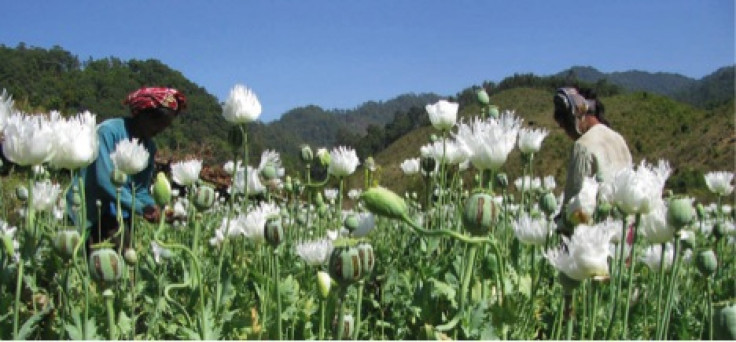Opium Poppy Farming Booming In Myanmar

Opium poppy cultivation in Myanmar is increasing, according to a new report from the U.N. Office on Drugs and Crime.
For the sixth consecutive year, cultivation of the plant used to produce the drug heroin has risen 17 percent, up to 126,000 acres (51,000 hectares) in 2012 from 100,000 acres in 2011, despite the government’s increase in eradication of the plant.
This year, the government of Myanmar eradicated nearly 60,000 acres of opium poppy, more than three times as much as the previous year.
“Despite the increase in eradication, what really matters is the increase in cultivation,” said Gary Lewis, UNODC regional representative for East Asia and the Pacific, in a statement.
“Cultivation indicates intention. And unless the farmers have a feasible and legitimate alternative to give them food security and reduce their debt, they will continue to plant poppy."
The majority of opium poppy cultivation occurs in Myanmar’s Shan state, where poor farmers have turned to growing the plant because it earns them a greater income.
"We must remember why farmers grow poppy. In most cases, it is because they need cash to buy food to feed their families,” said Jason Eligh, UNODC country manager in Myanmar, in a statement.
“Growing opium poppy provides much needed food security for many of them."
Myanmar is the world’s second-largest producer of opium poppy after Afghanistan, accounting for a quarter of all illicit cultivation, according to the UNODC.
Growing demand for heroin throughout Asia, particularly in China, has made cultivating opium poppy more viable than other crops for farmers.
The UNODC surveyed villages in Shan state this year and found that more than 95 percent them received no agricultural assistance from the government. Subsidies for food crops would be able to provide farmers with the extra income gained from opium poppy cultivation.
“In areas of instability like Shan and Kachin states with poor access to markets, there are few employment alternatives to poppy,” Eligh said.
“A sustainable long-term solution to poppy can only come through significant investment in stability, the rule of law and alternative development."
© Copyright IBTimes 2024. All rights reserved.











